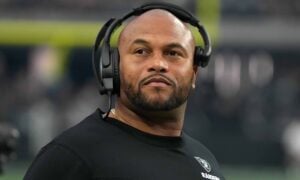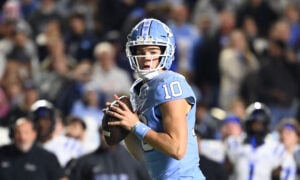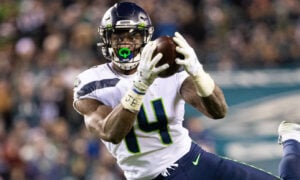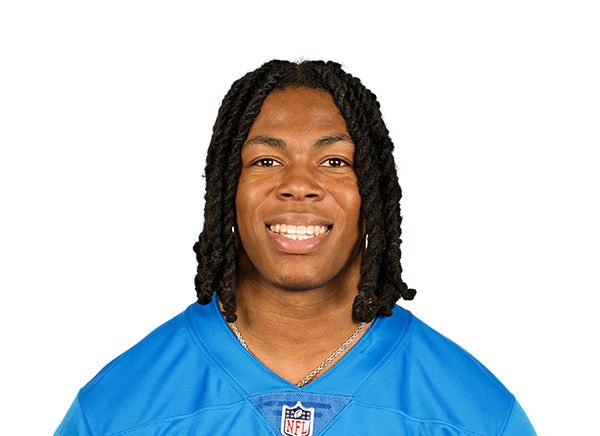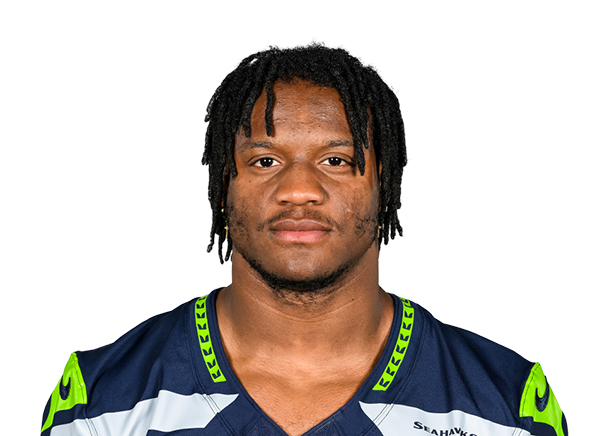How Replacement Referees Might Be Tanking Your Studs
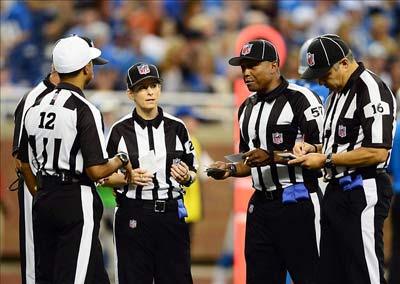 As of late it’s becoming vogue in a lot of circles to bash the replacement referees for the penalties they are, or are not, calling and how they are ruining the game. Players, coaches, commentators and, of course, locked out referees are all bemoaning this fact and are claiming their professional inexperience is affecting the outcomes of games. The chorus is becoming louder and louder and has gone from grumblings to raised voices at this point and guess what?
As of late it’s becoming vogue in a lot of circles to bash the replacement referees for the penalties they are, or are not, calling and how they are ruining the game. Players, coaches, commentators and, of course, locked out referees are all bemoaning this fact and are claiming their professional inexperience is affecting the outcomes of games. The chorus is becoming louder and louder and has gone from grumblings to raised voices at this point and guess what?
I’m about to pile on.
Many of these replacement referees come from college backgrounds; I’m not talking Division I officiating, either. Most of the replacement referees have Division II and even Division III experience. Worse yet, we now have referees officiating professional NFL games that come from backgrounds that include high school refereeing, calling junior college games, officiating Arena football games and, yes, we even have a replacement referee who can point to experience as a referee in the LFL – that’s the Lingerie Football League for the uninformed. With referees as illustrious as this, what could wrong?
I’m not particularly worried about them being out of position for key plays, nor am I really worked up about their inability to get player numbers, teams or the penalty itself correct when announcing it to the crowd on hand and the millions watching at home. That comment to LeSean McCoy from a replacement referee urging him to do better because he has him on his fantasy team, that just makes me laugh. There is something they are missing that is altering the game in a much more fundamental way and it’s becoming apparent through only two weeks on NFL play. What’s this mystery call they are missing?
Simple, it’s “Illegal contact.”
Illegal Contact is defined as making noticeable or significant contact with a receiver that has gone beyond five yards from the line of scrimmage. This rule was introduced to the NFL in 1994 and was significantly “beefed up” prior to the 2004 season. Many will argue this rule has significantly altered the NFL, transforming it from a rushing league and into a passing league.
So why does this matter?
Simple. No other football format or league has this rule, most importantly, college football. Illegal Contact, as a concept, is the sole domain of the NFL. Since these referees, for the most part, have never officiated NFL games, they aren’t looking for this penalty – it simply isn’t what they normally look for from play-to-play. More importantly, because this penalty isn’t being called as it should, the balance is shifting from a pass orientated offense to a run defending defense. This shift is occurring because passing offenses are now being thrown into disarray due to changes in their timing and how defenders are now allowed to essentially alter the routes of receivers. Since passing is now becoming much less effective, teams are being forced to change their game plans.
How is this changing the league?
At this point, it may be too early to effectively tell, but the games we’ve seen thus far are pointing to some very scary times ahead for owners who drafted stud quarterbacks, some wide receivers or tight ends. I say “some” wide receivers because slot receivers appear to be mostly immune to this issue due to the routes they typically run. Quarterbacks especially appear to be having a hard time with the lack of illegal contact calls. Take for instance the top five quarterbacks that typically come off the board – Aaron Rodgers, Drew Brees, Tom Brady, Matt Stafford and Cam Newton. Through two games of 2011 and 2012, these five quarterbacks posted the following statistics:
 These statistics point to a disturbing problem for owners of these quarterbacks. Every major statistic has regressed this year, including their completions (-8%), attempts (-2%), yards (-22%), touchdowns (-50%), interceptions (+85%) and sacks (+28%). The collapse of these statistics appear to have no other root cause other than the inability to effectively complete the passes these quarterbacks are used to completing.
These statistics point to a disturbing problem for owners of these quarterbacks. Every major statistic has regressed this year, including their completions (-8%), attempts (-2%), yards (-22%), touchdowns (-50%), interceptions (+85%) and sacks (+28%). The collapse of these statistics appear to have no other root cause other than the inability to effectively complete the passes these quarterbacks are used to completing.
What is leading me to this conclusion?
Players on both sides of the ball are telling anyone who will listen. Take Aaron Rodgers for instance, when being interviewed by Deion Sanders, he said, “I don’t think the illegal contact down the field is being enforced the right way. When you play a lot of man coverage, there’s going be times when they’re either pushing or holding or grabbing after five yards, and when it’s blatant, when that guy’s number one or two in the progression and it’s not being called, the rules weren’t exactly followed.”
Cortland Finnegan, a player known for his very physical style of play, was quoted this week as saying, “They just let you play football, they let you play football out there, and that’s one of those things you enjoy.”
As a savvy fantasy football owner you, like I, are no doubt thinking to yourself, “How can I take advantage of this?” After much thought, I’ve begun to develop some very basic short-term strategies should the referee lockout continue. These strategies are still being formulated and may change as things develop, however, as it stands right now this is what I’m suggesting:
- First, if I have a stud quarterback I’ve depended on as a cornerstone of my team, going forward I will start to lower my expectations for them.
- In regards to team defenses, I will be looking for defensive backs who are physical in their coverage. If they play the run well, this is even better.
- In flex positions if I have a choice between similar scoring running back and wide receiver, I am now leaning towards starting the running back.
- Tight ends will begin to become even more relied upon – this is due to their bigger size and shorter routes. This will negate, or at the very least minimize, the amount to which timing is affected.
- If a team has a minimal passing game to begin with, I am now also avoiding their running backs. This is due to the fact that if defensive backs can eliminate even the slightest chance of a passing game, they can now stack the box against their opponent’s running game.
- The inverse is also true. If a team has no running game, I am now avoiding the wide receivers on that team since it will become even harder to get the ball to those players.
- If I have a mobile (or even somewhat mobile) quarterback and a similarly scoring pocket quarterback, I now will lean towards the mobile quarterback. Pocket quarterbacks are going to have the hardest time with the lack of illegal contact enforcement; they will have to stay in the pocket longer and will be pressured much more frequently. Mobile quarterbacks on the other hand will be able to buy more time and present opportunities for their receivers to get open by moving out of the pocket and disrupting the coverage.
- If a team lacks a viable tight end, wide receivers who run a majority of their routes closer to the line of scrimmage will see benefits. This is especially true of slot receivers. It’s no accident that we are seeing slot receivers post substantial numbers for some teams.
- Tall, physical wide receivers will fare better during this lapse of enforcement. If a wide receiver has trouble getting off the line in press coverage, he is going to have even more problems for the time being.
- If an equally valued running back cannot catch the ball out of the backfield, try to use those on your roster who can. This is, of course, a great strategy regardless of replacement referees. However, now this is almost becoming a necessity.
Many of these strategies are ones a lot of us already use when targeting or avoiding players, but the recent situation may require many of us to double down on these strategies. For those strategies that are not commonly followed outside of this lockout, owners must weigh how long they feel this lockout or lack of illegal contact enforcement will continue.
When considering these strategies I’d like to urge caution, context and restraint. One must be careful not to irreparably damage their team in the long term simply to achieve short term success and wins. If the lockout ends in a few weeks, your team must be flexible enough to pivot and resume its original path. These strategies should only we used if you have the pieces in place currently or can obtain the pieces needed to achieve these strategies at a minimal price.
There are already some signs this lockout will continue for the foreseeable future. The NFL has just held talks with the referee’s union, but those talks were the first in nearly three weeks. At the very least, the talk of illegal contact being missed is intensifying to the point the league will undoubtedly be requiring the replacement referees to study, familiarize themselves with and be on the lookout for it if they can’t come to an agreement with the regular officials.
In the meantime, dynasty owners should become aware the replacement referees currently taking the field might be altering those owners championship hopes. As such, we all should proceed with caution and try to be flexible enough to deal with the current truths of the game. While we all want to win every week, any snap decisions may irreparably damage our long term outlooks.
Right now the best advice I can give is, “Be aware and beware.”






